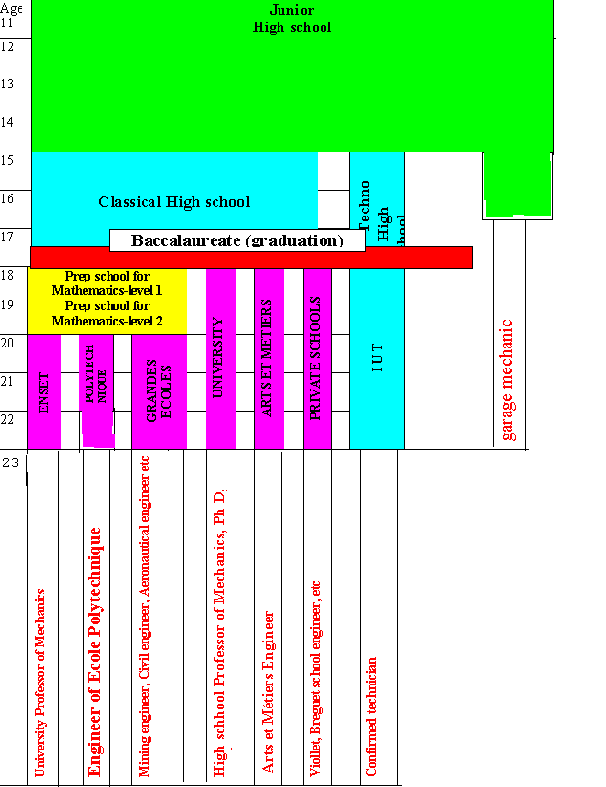
Education of Mechanical Engineers in France
REPORT TO ICOMES 2002
PREPARED BY
ASSOCIATION FRANCAISE DE MECANIQUE
AFM
Maison de la Mecanique
39-41 rue >Louis Blanc
F-92038 Paris la Defense
Tel + 33 1 47 17 64 89
Fax + 1 47 17 61 31
Email jean-pierre.chaquin@sfmeca.fr
Website afm@afm.asso.fr
There are various ways to become a Mechanical Engineer in France, it is summarised in the following figure and it will be described below

This figure shows how complicated the choice of an educational path in France can be and how all these paths are interconnected: it has to be noted that whichever path is chosen, it ends always five years after graduation at approximately the age of 23 years.
1- High school starts in France at the age of 10 years and lasts 7 years. There is a common stem up to the age of 15 and the student is asked to make a choice at that age and deepen his mathematics if he wishes to become an engineer.
2- The baccalaureate (graduation) ends the high school studies and a serious selection takes place at this stage. The students who have been successful during the last terms and have succeeded with a good score in their baccalaureate will be able to go to the so-called classes preparatoires that actually prepares them for the concours (a series of examinations through which a classification of the results open for them more or less qualified engineering schools, called Grandes Ecoles). The others, or those who do not like the heavily charged courses in the prep schools, will go to the University (that have also engineering branches). The students have to choose the topics they graduate in. Some other students, not really qualified for University, still have the possibility to enter in some of the minor engineering schools that deliver a state recognised engineer diploma after 5 years of study (see below)
3- Some students, (they are few in number but often become highly qualified engineers and namely Mechanical Engineers), choose a very different way and enter after the baccalaureate, in the so-called Ecole des Arts et Metiers In parallel with these schools there also exist four INSA (Institut National des Sciences Appliquées) that deliver engineering degrees.
4- ENSET, Ecole Normale Superieure, has been created for University Professors and high level Scientists, namely in the field of mechanics
5- Ecole Polytechnique is the best known and the most known Grande Ecole: 250 of the best qualified students coming from the prep schools are admitted at Ecole Polytechnique from which they graduate after 2 years of study (and 1 year of military obligations). They are all fit for industry but usually they undertake some further studies in a so-called Ecole d'Application, that is one of the other Grandes Ecoles referred to in the next chapter.
6-Although limited in number a few decades ago (Mining School, Civil Engineering School, Aeronautical School...) the number of Grandes Ecoles has increased considerably during the last decades and one can say that all students who choose to go to prep schools will find an engineering school from which they will graduate as engineers.
7- There are also minor engineering schools, usually privately owned and directed, that take care of the students who do not want or are not able to go to the Grandes Ecoles or to University
8- The engineering degree given by the Grandes Ecoles, the Arts et Metiers or the minor engineering schools are all state recognised, the tuition given by the school has been recognised by an official committee and the school itself has the ability to deliver or not a degree for a student.
9-There are also special cases that were not listed above. Some technicians who do not have the chance or the possibility to undertake long engineering studies can decide to become an engineer through specialized channels: these are the various Conservatoire des Arts et Metiers where these people attend evening or week-end courses. Some other technicians are well accepted by the company for which they work and become Ingenieurs maison, but their title is not always recognized by other branches of industry. CNISF, the French Council of Engineers and Scientists can deliver diplomas for such engineers after examination of their achievements.
10 Remark the aptitude for mathematics required for each of these formations decreases from left to right in the figure This paper describes in an informal and simplified manner the education of a French (Mechanical) Engineer.
Jean-Claude Lachat and Jean Fabri
| April 2001 | updated March 2002 | return |